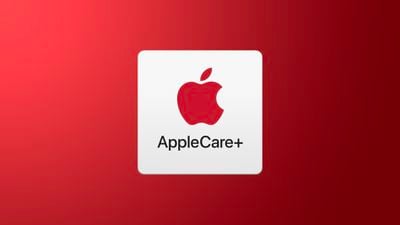Apple Raises Monthly AppleCare+ Subscription Price for All iPhones
Apple this week increased the prices for its monthly AppleCare+ subscription prices for the iPhone, raising the cost by 50 cents for all models in the United States.

Standard AppleCare+ for the iPhone 16 models is now priced at $10.49 per month, for example, up from the prior $9.99 per month price. The 50 cent price increase applies to all available AppleCare+ plans for Apple's current iPhone lineup, and it includes both the standard plan and the Theft and Loss plan.
The two-year AppleCare+ subscription prices have not changed, nor have the service fees and deductibles. The increased prices are only applicable when paying for AppleCare+ on a monthly basis.
Apple has not raised the prices of AppleCare+ subscription plans for the iPad, Mac, or Apple Watch.
Apple's price tweak for iPhone AppleCare+ monthly subscriptions come as it prepares to shift AppleCare+ purchasing options to subscriptions. Apple is phasing out one-time purchase AppleCare+ plans in retail stores and for on-device purchase as of this week.
In Apple Stores and in the Settings app on the iPhone, customers who make a purchase will have the option to purchase AppleCare+ as a monthly or annual subscription that renews, which eliminates any lapse in coverage and provides Apple with ongoing revenue after a two-year period.
Apple is keeping one-time AppleCare+ purchase options available in its online store for the time being, so customers who prefer buy a non-renewing AppleCare+ plan that expires at the end of two years can still opt for that.
Popular Stories
Last year, Apple launched CarPlay Ultra, the long-awaited next-generation version of its CarPlay software system for vehicles. Nearly nine months later, CarPlay Ultra is still limited to Aston Martin's latest luxury vehicles, but that should change fairly soon.
In May 2025, Apple said many other vehicle brands planned to offer CarPlay Ultra, including Hyundai, Kia, and Genesis.
In his Powe...
Apple today confirmed to Reuters that it has acquired Q.ai, an Israeli startup that is working on artificial intelligence technology for audio.
Apple paid close to $2 billion for Q.ai, according to sources cited by the Financial Times. That would make this Apple's second-biggest acquisition ever, after it paid $3 billion for the popular headphone and audio brand Beats in 2014.
Q.ai has...
The calendar has turned to February, and a new report indicates that Apple's next product launch is "imminent," in the form of new MacBook Pro models.
"All signs point to an imminent launch of next-generation MacBook Pros that retain the current form factor but deliver faster chips," Bloomberg's Mark Gurman said on Sunday. "I'm told the new models — code-named J714 and J716 — are slated...
Apple recently updated its online store with a new ordering process for Macs, including the MacBook Air, MacBook Pro, iMac, Mac mini, Mac Studio, and Mac Pro.
There used to be a handful of standard configurations available for each Mac, but now you must configure a Mac entirely from scratch on a feature-by-feature basis. In other words, ordering a new Mac now works much like ordering an...
Apple is planning to launch new MacBook Pro models with M5 Pro and M5 Max chips alongside macOS 26.3, according to Bloomberg's Mark Gurman.
"Apple's faster MacBook Pros are planned for the macOS 26.3 release cycle," wrote Gurman, in his Power On newsletter today.
"I'm told the new models — code-named J714 and J716 — are slated for the macOS 26.3 software cycle, which runs from...


















